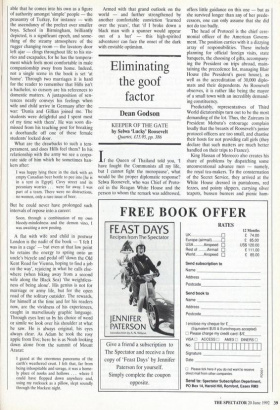Eliminating the goof factor
Dean Godson
KEEPER OF THE GATE by Selwa 'Lucke Roosevelt Quartet, ┬Ż1 5.95, pp. 386 If the Queen of Thailand told you, 'I have fought the Communists all my life, but I cannot fight the menopause', what would be the proper diplomatic response? Selwa Roosevelt, who was Chief of Proto- col in the Reagan White House and the person to whom the remark was addressed,
offers little guidance on this one ŌĆö but as she survived longer than any of her prede- cessors, one can only assume that she did not do too badly. ŌĆó The head of Protocol is the chief cere- monial officer of the American Govern- ment. The position carries with it a dizzying array of responsibilities. These include planning for official foreign visits, state banquets, the choosing of gifts, accompany- ing the President on trips abroad, main- taining the precedence list, managing Blair House (the President's guest house), as well as the accreditation of 30,000 diplo- mats and their dependents. As Roosevelt observes, it is rather like being the mayor of a small town with an incredibly demand- ing constituency.
Predictably, representatives of Third World dictatorships turn out to be the most demanding of the lot. Thus, the Zaireans in President Mobutu's entourage complain loudly that the breasts of Roosevelt's junior protocol officers are too small, and chastise their hosts for not providing call girls (they declare that such matters are much better handled on their trips to France).
King Hassan of Morocco also creates his share of problems by dispatching some unconventional advance men ŌĆö namely, the royal tea-makers. To the consternation of the Secret Service, they arrived at the White House dressed in pantaloons, red fezzes, and pointy slippers, carrying silver teapots, bunsen burners and picnic ham- pers; to the even greater horror of the White House curator, they proceeded to settle down on the red-carpeted floor of the main hall, portable stoves ablaze. Only the timely intervention of the Protocol office averted a major diplomatic incident.
Yet the 'goof factor' cannot entirely be attributed to damnable foreigners. Ameri- can ethics laws are now so strict that they seriously impede traditional diplomatic intercourse. For example, before one visit, King Hassan expressed a wish to present President Reagan with three of his finest Arabian steeds. 'Are they worth more than $120?' enquires the protocol office. 'Of course,' replies the incredulous Moroccan functionary. 'Well, I guess we'll just have to shoot 'em, stuff 'em, and put 'em in the Presidential Library', responds the repre- sentative of the world's only super-power. No wonder the Shah of Iran lost heart and fell.
More depressing still are those tedious Washington wives. One Senator's spouse asks Mrs Gorbachev how the Americans and the Soviets, working together, can find solutions to the problems of human rights and homelessness. 'What education do you have?' asks Raisa. 'I have a BA and I went to graduate school in Geneva'. 'Well, I am a philosopher and I will give you a philoso- pher's answer. At the moment of birth, every human being has a human rights problem'. 'Yes, but what about our imme- diate problems?' These questions are obstructionist', snaps the First Lady of Communism. Quite right.
The scope for Norman Wisdomish cock- ups was, of course, ample. Some readers will be disappointed to learn that the spinach at the banquet in honour of Yitzhak Shamir was not sprinkled with bacon; but they can, at least, derive conso- lation from the fact that the Air Force's Singing Sergeants serenaded the Israeli Prime Minister with the lyrics, 'Soon I'll be done with the troubles of the world, I want to meet my Jesus'. In a similar vein, the Brazilian President was forced to watch a bad samba troupe, which seemed to employ the ugliest mulattoes in town.
Sometimes, however, such mis- understandings prove - quite literally - to be an essential lubricant for statecraft. The Costa Rican President, when asked what he wants to drink, turns to his wife and says: 'Margarita, what do you want to drink?' But the butler only heard the word 'margarita', and kept them flowing: not only was the evening an outstanding suc- cess, but thereafter the Costa Ricans were much tougher on the Sandinista regime in Nicaragua. On such slender threads hang the fates of nations.
However, this book is more than just a string of entertaining anecdotes concerning the upper reaches of the Reagan adminis- tration. Roosevelt also writes movingly of her upbringing in Tennessee, as a first generation Lebanese American; of her par-
ents' attempts to arrange a marriage to a Druze notable; and of her eventual mar- riage to Archie Roosevelt, a grandson of Theodore Roosevelt and a distinguished employee of the CIA. During nearly 40 years of marriage together, she became an honorary WASP - although, with her Levantine heritage, she had difficulty in adjusting to the less-than-copious quanti- ties of food served up by the parsimonious Roosevelts on their country estates.
For the most part, Roosevelt's good manners served herself, and her country, well. However, at other times, they sent the wrong signal: a sycophantic speech deliv- ered by her at a banquet given in her hon- our by the Chinese President, Li Peng, was one of hundreds of official American pro- nouncements that emboldened the Chinese regime to launch its brutal crackdown at Tienanmen Square. For many dictators, the outward signs of respectability, in the shape of banquets and 21-gun-salutes, were as (if not more) important than the negotiations behind closed doors - as evidenced by the manner in which Nicolai Ceausescu used his public receptions in the West to legit- imise his rule in eyes of ordinary Rumani- ans. Roosevelt, who concerned herself with the style, rather than the substance, of poli- cy, has little to say about the unfortunate and perplexing side-effects of her work; but then, as she observed in the middle of a flap over a dinner menu, 'apple pie is much more complex than arms control'.



























































 Previous page
Previous page